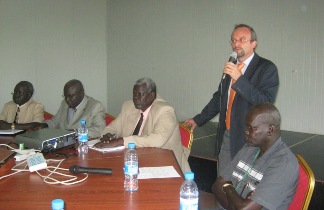Experts develop agricultural extension policy for South Sudan
By Julius N. Uma
November 18, 2010 (JUBA) – Plans by the Government of Southern Sudan to ensure food security through increased agricultural productivity appears to be on course, according to a team of experts working in partnership with the Ministry of Agriculture and Forestry (MAF), courtesy of an agricultural extension policy framework.

The extension service is described as a two-way communication and training process, aimed at enhancing knowledge, changing attitudes, behavior and improving skills for both farmers and extension workers, with a view to increase and improve farmers’ incomes and productivity on a sustainable basis.
About 90% of the southern population is thought to depend on subsistence agriculture; while between 80-90% of them generate less than $1 (SDG 2.5) per day. The majority of the population depend on emergency relief food from external sources.
In South Sudan, agricultural extension is not a new phenomenon, having been introduced in 1928 during the British-Egyptian colonial rule. The policy was initially pursued through road building meant to encourage communal settlement along the roads so that goods and services could be easily delivered to the rural populace and so that taxes could be collected.
While speaking during a one-day agriculture and livestock extension policy validation workshop held in Juba, the South Sudan capital, Waragak Galfuak Paguir, an advisor for the MAF praised the newly developed policy, saying that it will be essential for achieving enhanced food security and sustainable livelihood.
Massimiliano Pedretti, a Programme Manager at the European Commission appealed to the southern government, development partners and all stakeholders to closely work together towards the successful implementation of the agricultural extension policy.
“Let this agricultural policy not only be in paper, but focus should be made on how it can be implemented to fully benefit the intended population,” Pedretti said.
According to Dr. Loro George Leju Lugor, MAF’s Director General for research, training and extension service, an extension policy is the backbone of agriculture in any given economy.
“This extension policy is a cross-cutting approach which should be implemented so that it is easily understood and able to benefit the population in the 79 counties, 510 payams and 2,565 bomas of South Sudan,” Dr. Lugor said.
Meanwhile, lack of competent, motivated and well facilitated extension staffs particularly at the counties, payams and bomas; inadequate mechanisms in place for quality, lack of clarity on privatization and the lack of support to agricultural education and training, among others have been cited as major challenges to the extension policy in South Sudan.
The workshop, held in the Juba-based Beijing hotel attracted experts from MAF, the Norwegian Peoples Aid (NPA), the World Bank, European Commission (EC) and Food and Agricultural Organization (FAO). The policy was developed with support from the EC.
(ST)

Anyang
Experts develop agricultural extension policy for South Sudan
Our government need to embrace the best ways to create food to deals with hunger within the region instead of looking so adamantly to embraced the new ideas.
Sudani Logik
Experts develop agricultural extension policy for South Sudan
GoSS could easily improve food security in South Sudan if it did away with this expensive system of government and unnecessary luxries afforded to it! Money can certainly employ the best minds to improve the agriculture sector but as long state funds are mismanaged, those so called NGO’s will do little to safeguard the basic needs of the population.
Developed nation’s farmers are greatly helped by government subsidies to the point of producing surplus crops which is sometimes donated as aid. The government needs to have the political will to achieve what’s just for its people not what a few hard headed individuals want.